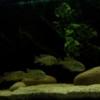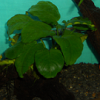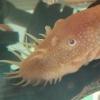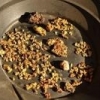From your post I'm guessing that you are thinking of doing this on a bigger than normal scale, so it would be worthwhile considering your project from an aquaculture point of view.
As far as fish nutrition, reliability, affordability, simplicity and practicality, using a high quality, pellet based food is the best thing you can do. Using a high quality processed food ensures that you have met the nutritional needs of your fish, and you are giving them everything they need and nothing that they don't. A downside to using live/fresh food is that you don't know exactly what is in the food as far as nutrients or things like potential parasites/pathogens etc. As a staple/everyday/maintenance food, a pellet is the best option.
The main reasons you would alter this approach is when;
A) the processed food does not come in an appropriate format, eg, a pellet is not suitable for young fry.
B ) altering the nutritional content/type of food will result in a desirable physiological change, eg upping the fat/protein content of a food to stimulate breeding behaviour.
C) as an intermediate food source for fussy/WC fish.
You will really only be worried about the first two. Considering the substantial time and effort that goes into setting up a live food production system, it's a good idea to consider any alternatives. For example, freeze dried black worms have about +60% protein, and are an excellent conditioning food for fussy fish, or to stimulate breeding activities. The numerous options of frozen food are great for this as well, and defiantly don't require as much effort.
Secondly, not all live foods are created equal. One thing that was drummed into me in my aquaculture systems lectures was that 'live foods aren't themselves the food, it's what inside them that's desirable'. A good example of this is with brine shrimp. Being rather simple organisms, they do not have the ability to manufacture complex biological molecules like we do, and so instead rely on other organisms that they filter out of the water to do it for them. This is a brine shrimps best asset, and what aquaculture facilities use them for. The quality of the brine shrimp will depend on the quality of the food that you feed them. Aquaculture facilities will feed their brine shrimp colonies a blend of single cellular algae that have been specifically harvested for their nutritional content. One of the most important factors is the level of Highly Unsaturated Fatty Acids (HUFA for short), this includes things like Omega 3s. These are often the limiting factors when it comes to fish health, development and growth rate. [As a side note, a couple of manufacturers, Continuum is an example, make a HUFA supplement. You can use this to soak flake and pellet food in to improve fish vitality etc.] at the other end of the spectrum, you can use yeast as a maintenance food for a brine shrimp colony that will keep it going, but the downside is that you have undermined the nutritional benefits of a live food and may as well have stuck with manufactured foods.
In short, are live foods completely necessary? Can you get away with using pre-made options like frozen or freeze dried? Is going through the hassle of rearing live foods going to result in a noticeable benefit to fish health, growth, development, etc? Can you ensure quality and consistency within and between batches of food? At the end of the day, it's up to you depending on how much time and effort you want to spend on this, and how many batches of fry etc you want to raise a month.
Edited by Luke134, 17 March 2014 - 11:04 PM.














